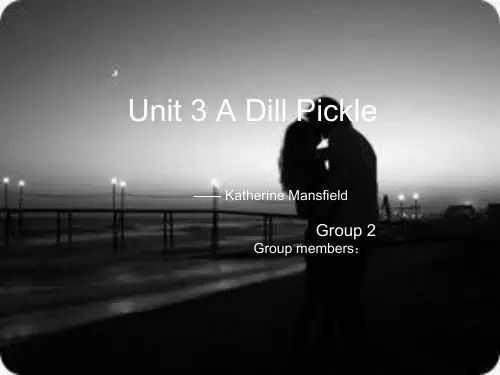Lesson Nine A Dill Pickle 现代大学英语电子课件book 3
- 格式:ppt
- 大小:777.00 KB
- 文档页数:13
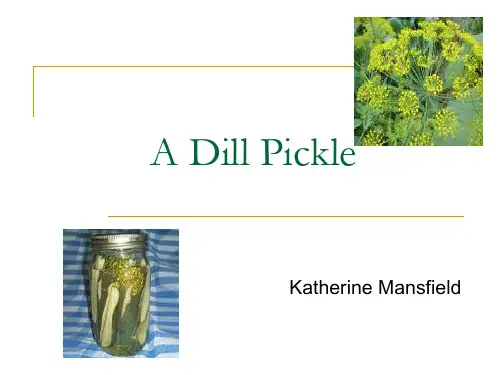
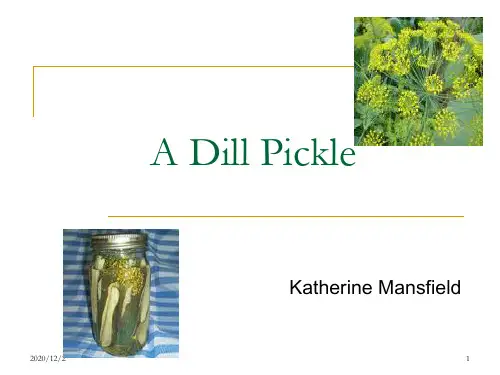
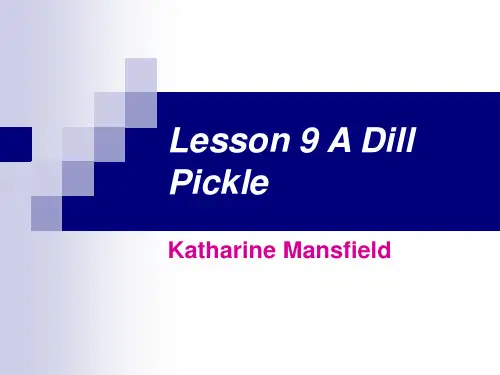

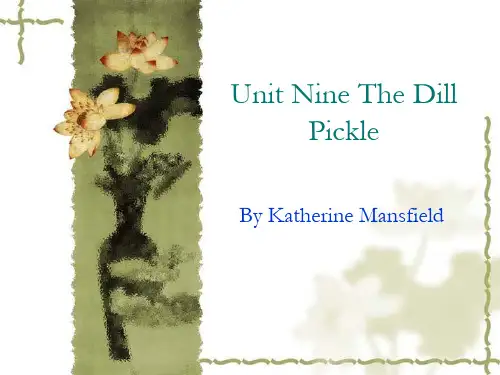
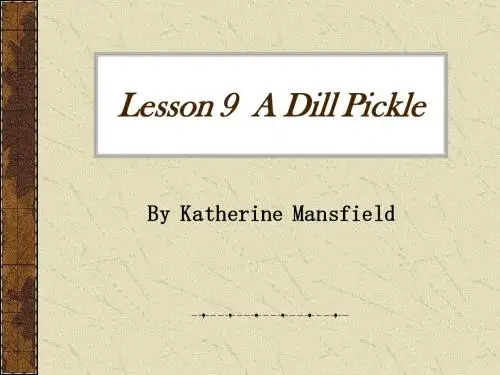


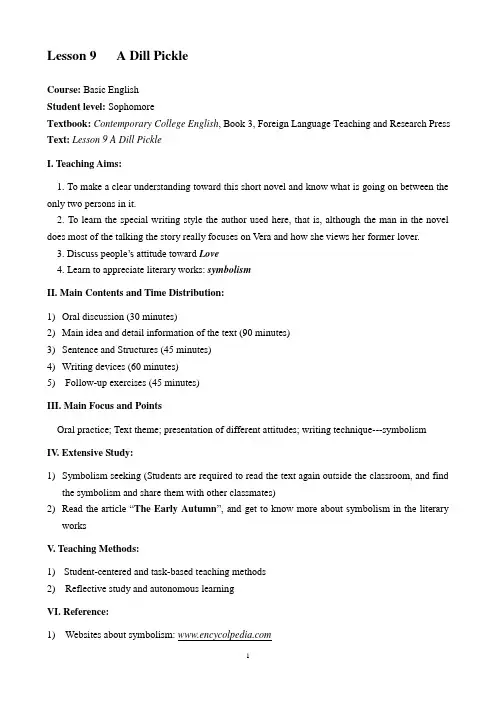
Lesson 9 A Dill PickleCourse: Basic EnglishStudent level: SophomoreTextbook: Contemporary College English, Book 3, Foreign Language Teaching and Research Press Text: Lesson 9 A Dill PickleI. Teaching Aims:1. To make a clear understanding toward this short novel and know what is going on between the only two persons in it.2. To learn the special writing style the author used here, that is, although the man in the novel does most of the talking the story really focuses on Vera and how she views her former lover.3. Discuss people‘s attitude toward Love4. Learn to appreciate literary works: symbolismII. Main Contents and Time Distribution:1)Oral discussion (30 minutes)2)Main idea and detail information of the text (90 minutes)3)Sentence and Structures (45 minutes)4)Writing devices (60 minutes)5) Follow-up exercises (45 minutes)III. Main Focus and PointsOral practice; Text theme; presentation of different attitudes; writing technique---symbolismIV. Extensive Study:1)Symbolism seeking (Students are required to read the text again outside the classroom, and findthe symbolism and share them with other classmates)2)Read the article ―The Early Autumn‖, and get to know more about symbolism in the literaryworksV. Teaching Methods:1)Student-centered and task-based teaching methods2) Reflective study and autonomous learningVI. Reference:1) Websites about symbolism: 2) Teachers‘ bookVII. Further thinking:What‘s your idea about the following statement?The supreme happiness of life is the conviction that we are loved.VIII.Teaching Procedure1. Task: The teacher‘s introduction about the authorPurpose: to let students get to know the author, her works and her writing style.Procedure:a. (Sts-T) Sts present the information they get about the authorb. (T→Sts) Teacher gives supplementary information about the author, her works and her writing style2. Task: The topic for discussionPurpose: To let students practice their listening and oral English and learn to present their ideas Procedure:a. Appreciate a song: Yesterdayb. (T→Sts) The teacher introduce the topic to studentsWhat are the most important things when you are in love with someone, or rather, when you want to marry him or her? And why?Possible answers: wealth, education background, family background, common interest, social status, friends circle, personalities / character, appearance, age…c.(S←→S) Students discuss the topic in pair-work wayd. (Sts→T) Students present their ideas about the topic3 Task: The symbolic meaning of the titlePurpose: To make students realize the symbolism of the title and get to know this writing technique Procedure:a. (T→Sts) Teacher‘s introduction: A dill pickleCucumber reserved in salty and spicy water with such ingredients as pepper, garlic, dill and vinegar. In Russia, it is eaten with hamburger as an appetizer.b. (T←→Sts) The symbolic meaning of the titleTeacher‘s guidance:Q1: How does a dill pickle taste?A dill pickle tastes sour, spicy, bitter and sweetQ2: When do people eat dill pickles?Q3: What does dill pickles stand for?c. (Sts→T) Possible answer to the symbolic meaning of the titleFrom the woman’s perspective:Pickle refers to the whole encounter of the woman. Vera's life is very dull. So the meeting serves as an appetizer just as a stone is thrown into the motionless water and stirs up various desires to break the dull life of Vera.On the whole, a dill pickle appeals to you with attractive colors: greenish jar, red chili. But once you open the jar, one is enough and you won't finish the whole jar, which implies that the meeting will not bring Vera full satisfaction. In the text, Vera is looking forward to the meeting with the man, but it turns out to be no satisfaction at all.From the man’s point of view:In his life, Vera is just an appetizer, not a main course, meaning she is not a person that the man would like to spend the whole life with. She only makes his dull life a little colorful.4 Task: Text appreciation – A Dill PicklePurpose: To analyze and understand the details of the textProcedure:a. (T→Sts) Teacher lists basic elements to analyze the storyb. (Sts←→T) Students r ead through the story, and present the information about the story: Setting of the story: in a restaurantProtagonists: Vera and her ex-lover (his name was never told)Plot of the story: a young woman and a young man who had been lovers once met again after six years of separation. They sat and reminiscedGreat changes between the two protagonists after six years:Vera The manAppearanceSocial statusFinancial conditionsMannersCharacter5 Task: Language study---Reflective Verb and Reflective PronounPurpose: To study how to use Reflective Verb and Reflective Pronoun correctlyProcedure: (T-Sts)Reflective VerbYou are forgetting yourself.I feel myself overwhelmed with sadness.Reflective Pronoun a. predicate objectHe absented himself from class to watch a football game.b. prepositional objectI have the room to myself.All this is between ourselves.c. predicative: be + reflective pronoun (身心健康)I am glad that you are yourself again.d. appositive:自己,亲自,本人They themselves are to blame. (They are to blame themselves.)6 Task: Extension---oral and writing practicePurpose: To cultivate the students‘ critical literary appreciation abilityProcedure:a. Dramatize the whole story, and pay special attention to the psychological movement of the main character.b. writing task: Write a short essay of about 160—200 words on the changes Vera found in her former lover when they met again six years later.7. Task: Discussing class activitiesPurpose: To reflect on class activitiesProcedure:a. How the lesson was divided and what basic activities were done.b. What you feel you have got from the activities?c. Do there any points need more work?8. Task: Group DiscussionPurpose: To foster students‘ desire to discussion the things in daily life.Procedure:a. (T-Sts): What‘s your idea about the following statement?The supreme happiness of life is the conviction that we are loved.b. (Sts-Sts): Present their ideas on the public email system.9. Task: class quizPurpose: To check students understanding of the textProcedure:a. Student will be asked to retell the text before a new class.b. The class will do some dictation in class time.IX.Language Points:1. be seated: seat oneself, sit down in some place; locate at someplace就座,坐着,位于He was seated at one of those little bamboo tables.He seated himself at one of those little bamboo tables.2. He was peeling an orange.n.—v. to peel potatoes; to husk the rice; to shell the peas; to weed the garden; to shear the sheep(to cut down the fur of the sheep); to scale the fish3. …to meet her eyes.in my eyes: 我的意见; Eye front: (列队)向前看; have sb. in one‘s eye: 挂念; in the public eye: 公然的, 众所周知; keep an eye on: 留神挂念; run one‘s eye through: 浏览; the eye of day:(诗歌用语)太阳4. light up:(of a person‘s face, etc.) to become bright or animated (指人的脸等)发亮,春风满面;容光焕发Her face lighted up when she heard the good news.5. ― You’ve changed. You’ve changed very much,‖ he said, staring at her with that eager, lighted look. ―You look so well. I’ve never seen you look so well before.‖No. she was not feeling well. She could not bear the cold weather. She shuddered often from the cold. And she was beginning to feel the effect of her growing age. Quite likely she was sick at that time.Probably he tried to say sth. to make her happy or to compensate for his not recognizing her at the first sight.6. …loathe it: hate it very much厌恶憎恨Comparison among detest, abhor, abominate and loathedetest: 强烈的敌视反对abhor: 不喜欢厌恶因为害怕而退缩abominate: 强调特别不喜欢经常指道德上的谴责loathe: 讨厌非常不喜欢主要指人生理上的自然反应7. You were saying:an expression used to encourage someone you just interrupted to continue to spea k. In this sentence, the man didn‘t encourage Vera to talk about herself. He wants to turn the subject back to himself.8. that trick of his: = his trick 强调结构.―Look at that son of yours,‖ the husband shouted at his wife.I like that car of yours. It looks so beautiful.9. exasperate:a. to annoy, to vex; to irritate very much; 使人苦恼,烦恼aggravate: (informal) 惹人生气打搅别人annoy:故意麻烦别人使其气愤烦躁exasperate: 由于一时的不冷静或经历了一再烦恼后无法忍耐而变得愤怒irritate: 不断重复的无礼貌的或粗鲁的行为使人失去耐心而恼火aggrieve:使感受到痛苦或烦恼distress: 使忧虑或受打扰nettle: 尖锐的但短暂的骚扰rile: 激起怒火怨恨的煽动peeve: 经常激起小的或发牢骚的愤怒v. 恶化加重exasperate: 增加严重性或紧张程度aggravate: 使事情变得更坏更严重deteriorate: 损害或降低质量性质或价值的退化exacerbate: 增加暴力程度激烈程度使形势恶化worsen: 恶化使变得更坏10. haunt: vt.(1) 常到,常去;(思想、回忆)萦绕;(疾病)缠住;Memories haunted her.(2) (气氛)充满,弥漫 e.g. Memories of former gaiety haunted the house.11. …behaving like a maniac about the wasps—waving them away, flapping at them with his straw hat, serious and infuriated out of all proportion to the occasion. How she had suffered.What happened that afternoon that made Vera suffer? (He was so childish, trivial, and ridiculous that she felt that he had made a fool of them both.)wave sb./sth. Away: to show that (a person or vehicle) should move in the specific direction, by waving one‘s hand 向(某人或车)挥手示意向某方向移动.She waved them away impatiently.Out of all proportion to the occasion:completely uncalled–for; totally unnecessary under the circumstances12. Yes it had been a wonderful afternoon, full of flowers and—warm sunshine. Her thoughts lingered over the last two words. Her thoughts lingered over the last two words. Which two words?(warm sunshine) Why? (She wished that she could have some warm sunshine at that moment.)13. And in the warmth, as it were, another memory unfolded.As she remembered the warm sunshine, that was part of their experience of Ken Gardens, another memory came to her mind, similarly pleasant.as it were: as if; as you might say; so to speak. Used to comment on the speakers own choiceof words, which may give only approximate meaning. 用以评断自己用词是否恰当,指词义接近而已。

